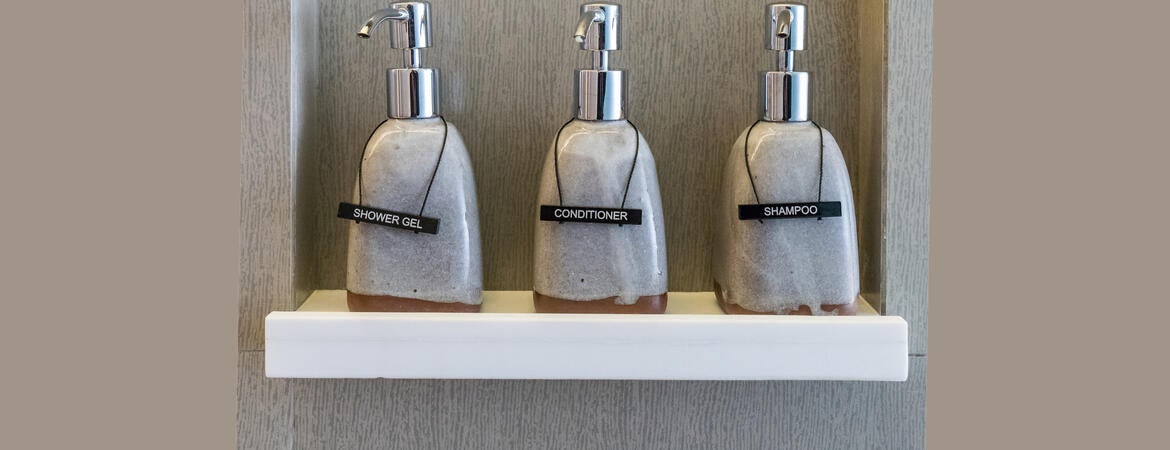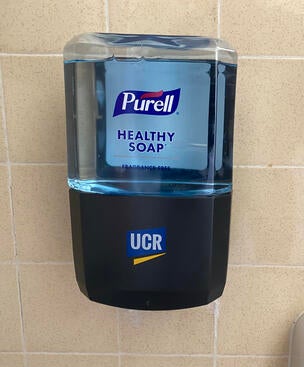
As consumers, we are becoming more communal. Among other products we now share with strangers are shampoo and body wash in containers affixed to hotel suite showers as well as hand sanitizers in public dispensers at gyms, campuses, libraries, and other facilities.
The benefits are several: hotels save on toiletry costs, plastic waste is reduced, and we lower our risk of contracting infectious diseases.
Yet, such sharing appears to also result in some unexpected waste, according to a paper published in the Journal of Marketing Research that is co-authored by Thomas Kramer, a professor of marketing at the University of California, Riverside.
Kramer and his co-authors examined a suite of studies that probed the behaviors and attitudes of people when they shared hotel toiletries, hand sanitizers, and plant food used by college students, among other products.
The bottom line?
“Most of the studies show that people believe the product is less efficacious, meaning it doesn't work as well, when they share it with strangers rather than friends,” Kramer said. “Then, in some studies, it shows that it actually leads to them using more to make up for that perceived low efficacy.”
The research also identified ways to reduce overuse.
“One way to reduce wasteful use is by making consumers think they're not sharing with strangers, but instead sharing with family or friends,” said Kramer, who is also an associate dean of undergraduate programs for UCR’s School of Business. “The second way is by increasing a person’s identification with the product, even when it is shared out.”
A good example, he said, is the shared hand sanitizer stations on the UCR campus. At these stations, refillable bottles of sanitizer and liquid soap have labels with the UCR logo.
“The UCR logo makes me identify with the hand sanitizer,” Kramer said. “So, I no longer feel that it's sharing with strangers because of my identification with UCR, and it will stop me from using too much.”
The plant food study illustrated this phenomenon. College students were tasked with an experiment that included fertilizing plants with a shared container fertilizer. When college students did the experiment individually, they used less than the recommended amount of fertilizer. But when they worked in teams with students they didn’t know, they used more.
Kramer finds these results fascinating because behaviors that make no practical sense (using too much shampoo won’t make your hair cleaner, for instance) have major implications for business and program managers in terms of costs and consumer satisfaction.
“It doesn't make sense, but it happens,” Kramer said. “It shouldn't matter, but it does matter.”
Sharing products with strangers may go back to the first set of salt and pepper shakers left on a restaurant table for the next customer, but it is a trend now on the rise. The COVID19 pandemic made shared hand sanitizers ubiquitous. Starting this year, California banned single-use toiletries in plastic containers and similar bans are proposed in New York and Hawaii. Additionally, nonprofit organizations are teaming up with Coppertone to provide shared sunscreen dispensers at beaches, parks, and public swimming pools to reduce skin cancer risk.
“It a trend that’s going to keep growing because of our sustainability and health concerns,” Kramer said.
The paper is titled “The Influence of Shared Consumption on Product Efficacy Perceptions: The Detrimental Effect of Sharing with Strangers?” The lead author is Lama Lteif of the University of New Mexico, and the other co-authors are Lauren Block and Mahima Hada of the Baruch College at City University of New York.
Kramer said he expects the results of the paper to inform managers for more effective and efficient use of shared products, while also minimizing the costs.
“We want people to share certain products, but we don't want them to overuse them,” he said.





